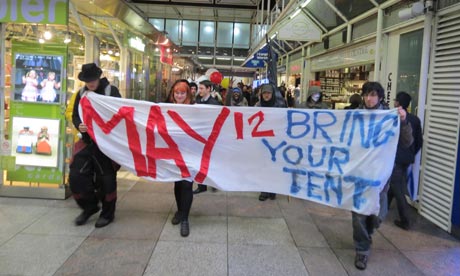Protesters demanding greater social and economic justice to stage comeback events in cities worldwide

Occupy London protesters enter Liverpool Street station ahead of their weekend of action. Photograph: Heardinlondon/Demotix/Corbis
The Occupy movement, whose ramshackle tented protest demanding greater social and economic justice spent more than four months outside St Paul's Cathedral, is planning a comeback this weekend which could see camps spring up in London and dozens of cities worldwide.
The 12 May events, marking the first anniversary of the Indignados movement in Spain, the precursor to Occupy, signify a relaunch for the coalition of campaigners whose protests created huge attention in London, New York and elsewhere before being evicted or fizzling out over winter.
In London, protesters are set to meet at St Paul's, in the City of London, at 1pm on Saturday ahead of action which remains secret. However, given the instruction for participants to "bring a tent", it seems a new camp is intended.
Organisers say no tents will be pitched at St Paul's. Instead, after speeches the marchers will be led, or directed by text message, elsewhere in the City. The Occupy London website has a "Meet the 1%" map showing a list of potential targets, mainly banks and financial institutions, as well as lobbying firms. The intention is to keep attention on global finance, rather than, as with St Paul's, a message muddied by a long debate about the church's response to their new neighbours. However, such private sector targets could see swift police action.
"It's time to hit the financial targets," said Ronan McNern from Occupy London. "If we're evicted, fine, but we'll come back. There will be comparison with what happened before, but we're in a different time and a different place."
Since the St Paul's protest ended, London activists been talking with the parallel Take the Square movement and other groups in Latin America, Africa, Asia and the Middle East, to draw a manifesto for the Global Spring. Described by McNern as a work in progress, this lists social justice demands ranging from everyone having "access to an adequate income for their livelihood", to a financial transaction tax and the enforced separation of banks' retail and investment arms.
A website promises action in several dozen cities worldwide on what is being termed M12, with protests also planned three days later, the anniversary of the first demonstrations in more than 50 Spanish cities a year ago. In London, the M15 protests will centre on the British Bankers' Association headquarters in the City.
What remains to be seen is whether Occupy can attract as much attention and commitment as it did in October, particularly after many of the more committed activists spent so long enduring cold and primitive conditions at St Paul's. The camp was praised for its organisation and efforts to reach others – the Tent City University, in fact a draughty marquee with a PA system, offered daily lectures to all-comers – but later struggled as a number of homeless people, some with drink, drugs or wider mental health problems, attached themselves to the camp.
McNern said about 1,000 people had committed via Facebook to joining Saturday's protest. "A month ago, was there the energy to get up and do another occupation? It was a bit touch and go. But now the energy is growing … Things could fall flat, but that's not the end of the process."By seeming coincidence, a day before the new action came the news that the last remaining outpost of the original Occupy London camp is to faceeviction. The tented protest on Finsbury Square, just east of St Paul's, began as a spillover camp in late October and has remained in place. Islington council, which owns the land, announced it would take legal action if the campers did not leave within a week, saying many of the original activists had been replaced by "a group of vulnerable and homeless people who would be better cared for elsewhere".
No comments:
Post a Comment